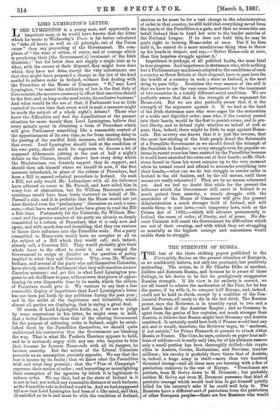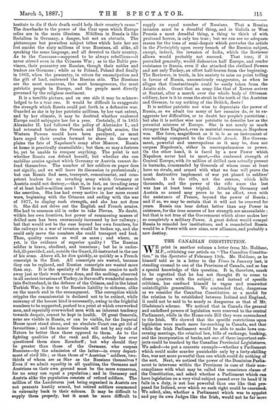THE STRENGTH OF RUSSIA.
THE last of the three striking papers published in the Fortnightly Review on the present situation of Europe is, as we confidently believe, not only too pessimist, but positively misleading. The writer, be it Sir Charles Dilke or another, dislikes and distrusts Russia, and because he is aware of those feelings, in his desire to be fair he prodigiously exaggerates Russian strength. If his view in its entirety is correct, we are all bound to admire the moderation of the Czar, for he has the power, if he wills it, to conquer half Europe, and, indeed, could not be held in check, except by a coalition of the Con- tinental Powers, all ready to die in the last ditch. The Russian power, says the Reviewer, is in quantity equal to two and a half times that of the Austrian Empire ; and as Germany is, apart from the genius of her captains, not much stronger than Austria, it follows that Russia might beat Germany and Austria combined. It certainly could beat both if France would lend any aid, and it would, therefore, the Reviewer urges, be "madness, if not suicide," for Prince Bismarck at present to attack either Russia or France. The Czar, he says, controls on paper four mil- lions of soldiers—it is really only two, for of his ultimate reserve only a small portion has been thoroughly drilled—his crypto allies in Austria, Czechs, Rutheniane, and Serviane, number millions ; his cavalry is probably three times that of Austria, is, indeed, a huge army in itself—more than two hundred thousand strong—and all these men are burning with afire of patriotism unknown in the rest of Europe. "Frenchmen are patriots, from M. Grevy down to M. Drumont ; but probably neither M. Chevy nor even M. Drumont possesses that kind of patriotic courage which would lead him to get himself quietly killed for his country's sake if he could well help it. The Russians have a different sort of patriotism from the patriotism of other European peoples—there are few Russians who would
hesitate to die if their death could help their country's cause." The drawbacks to the power of the Czar upon which Europe relies are in the main illusions. Nihilism in Russia is like Socialism in Germany, a danger, but not an obstacle. The picturesque but powerless subject tribes which hate her are lost amidst the sixty millions of true Russians, all alike, all speaking the same language, and all devoted to their country. As to the Caucasus—supposed to be always rebellious—it never stirred even in the Crimean War ; as to the Baltic pro- vinces, their peasantry are Russian, though their nobles and traders are Germans ; while as to Poland, Poland died finally in 1863, when the peasantry, in return for emancipation and the gift of land, embraced the Russian side. The Russians are the most numerous, the most homogeneous, the most patriotic people in Europe, and the people most directly governed by the religious sentiment.
It is a terrible picture, and on one side it may be acknow- ledged to be a true one. It would be difficult to exaggerate the strength which Russia could put forth in a defensive war. Guarded as she is by her patriotic millions, by her vast extent, and by her climate, it may be doubted whether coalesced Europe could subjugate her for a year. Certainly, if in 1855 Alexander II. had followed the policy of Alexander I., and had retreated before the French and English armies, the Western Powers would have been paralysed, or must have urged their armies forward to share in those vast plains the fate of Napoleon's army after Moscow. Russia at home is practically unassailable ; but then, so may a fortress be, yet be unable to conquer anything. The point is not whether Russia can defend herself, but whether she can mobilise armies against which Germany or Austria cannot de- fend themselves. The number of her soldiers on paper does not signify, and we will leave its discussion to professionals ; but can Russia find men, transport, commissariat, and com- petent leaders for an invading army which Germany or Austria could not destroy,—that is, in fact, an invading army of at least half-a-million men ? There is no proof whatever of the assertion. She has had every motive in her more recent wars, beginning with the Crimean and ending with the war of 1877, to display such strength, and she has not done it. She did not drive out the English and French armies. She had to summon aid in order to take Plevna. No doubt, within her own frontiers, her power of summoning masses of drilled men has been enormously increased by her railways ; but that would not be the case beyond her own frontiers, for the railways in a war of invasion would be broken up, and she could only move the numbers she could transport and feed. Then, quality counts as well as mass ; and where, as yet, is the evidence of superior quality ? The Russian soldier is brave, obedient, and tenacious ; but he is under- fed, ill-provided, and, outside the Guard, ill-instructed in the use of his arms. Above all, he dies quickly, as quickly as a French conscript in the East. All conscripts are wasted, because they can be replaced, and Russian conscripts are wasted more than any. It is the specialty of the Russian armies to melt away just as their work seems done, and the melting, observed in all ancient invasions of Turkey, in Suvaroff's wonderful march into Switzerland, in the defence of the Crimea, and in the latest Turkish War, is due to the Russian liability to sickness, alike on the march and in the encampment. The corruption which cripples the commissariat is declared not to be extinct, while economy of the honest kind is necessarily, owing to the frightful numbers to be supported, pushed to a point at which overworked men, and especially overworked men with an inherent tendency towards despair, cannot be kept in health. Of great Generals, none are visible in Russia, or can be visible, for the Imperial House must stand alone, and no absolute Court can get rid of favouritism ; and the minor Generals will not by any rule of Nature be better than those opposed to them. As to the fighting qualities of the rank and file, nobody has ever questioned them since Zorndorff ; but why should they be greater than those of the Germans, who surpass Russians—by the admission of the latter—in every depart- ment of civil life ; or than those of " Austrian " soldiers, two- thirds of whom are as Slav as the Russians themselves I Even if we admit equality in all qualities, the Germans and Austrians on their own ground must be the more numerous, for no army can equal a population ; and in Germany and Austria alike the population consists of retired soldiers. The million of the Landeturm just being organised in Austria are not peasants hastily armed, but retired soldiers summoned in extremity back to their (Aorta. It may be difficult to supply them properly, but it must be more difficult to supply an equal number of Russians. That a Russian invasion must be a dreadful thing, and in Galicia or West Prussia a most dreadful thing, a thing to think of• with profound horror, is only too true ; but we can see no adequate reason for the tone of semi-despair which pervades the article in the Fortnightly upon every branch of the Russian subject, except, indeed, the invasion of India, which the Reviewer allows would probably not succeed. That tone, if it prevailed generally, would dishearten half Europe, and render resistance to Russia, even if she attacked the civilised Powers and not only Turkey, an effort half-beaten from the beginning. The Reviewer, in truth, in his anxiety to miss no point telling in favour of Russia, unconsciously exaggerates, as when he alleges that Constantinople could be easily taken from the Asiatic side. Grant that an army like that of Xerxes arrives at Scutari, after a march over the whole body of Ottoman soldiery, how is it to cross the strait in the teeth of the Austrian and German, to say nothing of the British, fleets V It is neither patriotic nor wise to depreciate the power of Russia, as we admit too many of her enemies do, or to ex- aggerate her difficulties, or to doubt her people's patriotism ; but also it is neither wise nor patriotic to describe her as the potential mistress of Europe. She is not nearly as much stronger than England, even in material resources, as Napoleon was. Her force, magnificent as it is, is as an instrument of war nothing compared to the Grande Arm de. Her Govern- ment, powerful and unscrupulous as it may be, does not surpass Napoleon's, either in unscrupulousness or power. On the other hand, it is faced by a new Power which Napoleon never had to meet,—the coalesced strength of Central Europe, with its million of drilled men actually present in barracks, commanded by Generals of whom some at least have no rivals, and armed with what we fear will prove the most destructive implement of war yet placed in soldiers' hands. It is the rifle, not the cannon, which kills thousands, and the power of the rifle since the last war has at least been tripled. Attacking Germany and Austria so armed may prove to be an effort, even with the assistance of France, beyond the power of Russia ; and if so, we may be certain that it will not be renewed for years. Russia can bear defeat better than any Power in existence, for the true sources of her strength are unassailable ; but that is not true of the Government which alone makes her so completely a military Power. A great defeat would compel Russia to remodel her institutions, and a remodelled Russia would be a Power with new aims, new alliances, and probably a new destiny.



































 Previous page
Previous page